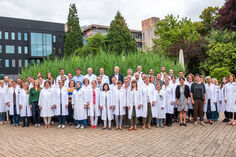Who succeeds in maintaining a good quality of life in old age?
- A Comparison of prediction models using machine learning approaches and individual growth modelling.
Summary
Given the present demographic trends, "successful aging" and the maintenance of quality of life in old age are among the most crucial areas of aging research. The aim of this study is to identify predictors of quality of life using data from the ESTHER study, a population-based study in the elderly population of Saarland. Machine learning algorithms and individual growth models will be employed to predict quality of life over a period of 20 years.
The study is conducted by Dr. C. Paul under the supervision of Prof. B. Wild, in collaboration with Prof. Hermann Brenner and PD Dr. Ben Schöttker from the DKFZ (Department of Clinical Epidemiology and Aging Research).
Project management
Prof. (apl.) Dr. sc. hum. Dipl. Math. Dipl. Psych. Beate Wild
Dipl. Math. Dipl. Psych., Leading Biometrician
Cooperation/association partners: DKFZ, Prof. Hermann Brenner and PD Dr. Ben Schöttker
Supported by: AI Health Innovation Cluster - part of the Heidelberg Mannheim Health & Life Science Alliance, supported by the Ministry of Science, Research, and the Arts of Baden-Württemberg (2024)







